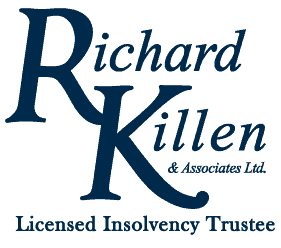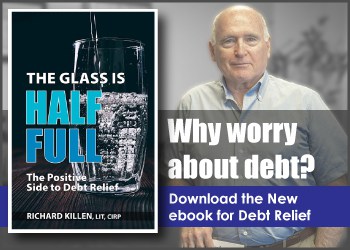Richard Killen’s Christmas Message 2019

December is a very exciting and interesting time of year. From the official beginning of Winter to the various religious celebrations, such as Christmas and Hanukkah. It’s also a time for some philosophical pondering; reviewing the year past and formulating our resolutions for the coming year. Yes, December can be a very important month. It certainly is a good time to appreciate all the good things we are given, especially when they occur through no effort of our own.
True, not everything that happens to us is positive and easy to take. Everyone has the challenge of dealing with negative things like health problems and all the other personal trials life throws at us. Sometimes it feels like that’s all there is. But it isn’t, is it?
In the book I wrote, The Glass Is Half Full, I try to make the point that no matter how difficult our problems and challenges, the attitude with which we face them goes a long way to getting us through it and even turning these things around. Most importantly, we cannot let the bade things that happen to us define how we see ourselves.
I can’t think of a more valuable way to wind up the year. Maybe that’s why Christmas and Hanukkah take place at this time. For thousands of years these religious celebrations, and their cousins in other faiths, remind us of all the positive gifts life provides and how we should never take any of it for granted. They also encourage us to believe that facing up to our daily toil and turmoil courageously pays off for us in the end. That’s something we owe to ourselves and to those we love.
So with that thought, I’ll which all of you a very Merry Christmas and Happy Hanukkah and hope that you and yours are blessed with good health and happiness throughout 2020.
How to Save Money with Credit Cards

Many of us abuse the use of our credit cards and often end up in debt. However, if you can use the plastic in a responsible manner, you can actually save money with credit cards, and are often better off using them rather than paying in cash.
Here are some money saving strategies you can take advantage of to get the most out of your credit cards.
Rewards and Points
When you have a credit card that earns points, you can earn as much as five points for every dollar you spend. There are also several occasions when companies will offer special three-month promo periods where you can earn double or triple the usual amount of points. When you reach a certain point threshold, you can redeem your points by buying items direct from the credit card company’s rewards catalog or exchange those points for hotel stays, merchandise, gas, shopping vouchers or lifestyle experiences like concert tickets, movie tickets, fitness trackers and spa treatments.
The trick is to find the right rewards card that best fits with your spending pattern. For example, if you patronize a particular brand of clothing, gas station, hotel chain or airline, you can earn points and enjoy rewards faster. In this way, you get to Save money with credit cards in exchange for points and rewards and enjoy some really great perks — which if you add everything up is basically more beneficial than if you paid outright with cash.
Frequent-Flyer Miles
With travel rewards credit cards, you would rack up miles every time you book a flight with a specific airline. When you have accumulated enough frequent-flyer miles, you can redeem these miles for airline tickets, special airline discounts, companion tickets, hotel room discounts and other perks such as rental cars, use of airport lounges, cruises, trip cancellation insurance, trip delay reimbursement, lost luggage reimbursement and other reward options. Now that’s some very valuable mileage with huge savings for you! If you travel frequently – as in a lot – this could be a very valuable credit card reward for you. It goes without saying that if you barely ever travel, this is not the type of credit card for you.
Cash Back
Cashback credit cards are great because you can literally earn cash back every time you make a purchase on your credit card. The cashback is credited back to you on your monthly bill. When you check your next monthly statement, you can see the cashback offsetted on the month’s credit card bill. Some cards offer 2%, 3% or even as much as 6% cash back on selected purchases. There are some cards that offer an even higher rate of cash back but requires you to deposit the cash reward directly into an investment account.
With a cash back card, you can earn rebates mostly on dining, groceries, gas, food delivery, for shopping at specific stores. This lets you save money with credit cards on essentials like food, fuel, groceries and other daily necessities. However, cash back cards require a minimum spend each month before you can start earning cashback and they set a limit to how much cashback you can earn per month. If you’re confident you can hit the minimum monthly spend without hurting your budget, then the cashback reward may be worth it to help you save money on groceries, dining, petrol and other essentials every month.
Consolidate your credit card debt carefully
If you have high credit card debt , you can transfer your credit card balances to help you pay off debt. A balance transfer card offers a 0% or a low APR on the amount that is moved over, but only for a limited introductory period. To make sure you save money on this strategy, you need to be able to pay off the entire debt balance before the promotional rate period is over, in order to avoid any increase in the card rate. You can still save money whether the new card offers a 0% or low APR, and in the end it may still be worth doing a balance transfer because essentially the new balance transfer card carries a much lower APR than your old credit card. Calculate everything carefully. It would help a lot if you do a cost benefit analysis so you can take into account all costs and charges, like if you’ll be charged a balance transfer fee if you do the switch.
It’s impossible to get into debt trouble if you know how to use credit cards to your advantage. In fact, there have been many instances where the credit savvy can even save money with credit cards and use them in the most favorable way. They are a very handy tool to have in your life and if you are careful about how you manage your spending when using credit cards you can benefit a lot from all the perks they offer without damaging your credit and putting yourself in debt trouble.
2018 INSOLVENCY & RESTRUCTURING EXCHANGE
On October 26, 2018, Richard Killen, Bonnie Bryan and Michele Meitz attended the 3rd annual 2018 Insolvency & Restructuring Exchange in Toronto.

This is the Canadian Association of Insolvency and Restructuring Professionals (CAIRP) largest one day event of 2018. Almost ninety percent of Licensed Insolvency Trustees, licensed under Canada’s Bankruptcy and Insolvency Act are members of CAIRP.
CAIRP was created as a non-profit corporation in 1979 to advocate a fair, transparent and effective system of insolvency/restructuring administration throughout Canada.
This event is the best place for professionals from consumer and corporate restructuring practices to network and learn together.
We were glad to get the opportunity to meet and hear from fellow CAIRP members, lawyers, members of the judiciary, lenders and government officials as part of the days events.

Is A Payday Loan A Good Idea?
In this video, Richard Killen, a Licensed Insolvency Trustee in Bankruptcy Scarborough talks about whether a Payday loan is worth considering.
I guess one can say that going into debt, any kind of debt, is hardly ever a good idea. Usually, the cost of the debt outweighs whatever benefits you may get from borrowing the money. However, sometimes debts make a good case for making some worthwhile. For instance, is a mortgage worthwhile? Because you borrow a large amount of money for buying a house, you are going to pay back that money with interest but the house will appreciate in value. And over time that appreciation more than outweighs the cost of the debt. Maybe that kind of debt is a good idea.
Ultimately, it always boils down to whether the cost too much and how much is the cost? Now there is going to be interest on any loan and that is what you must consider. Now, unfortunately, Payday loans are on the high end of all interest calculations so one can say that it is tough to say if a Payday loan is worth it.
If a Payday loan is a part of your coping with bills, you should consider having a consultation with one of our trustees. It may be the most stress relieving call you make this year.
The Role of a Licensed Insolvency Trustee in Mississauga
The role of a Licensed Insolvency Trustee in bankruptcy Mississauga is critical in helping consumers who choose to go through the process of filing for bankruptcy to solve their overwhelming debt problems. Not only do they play a very big part in helping to minimize confusion, but they are present from beginning to end to make sure that every step of the process gets done as quickly and efficiently as possible.

Licensed Insolvency Trustees (LITs) are the only professionals licensed by the Federal Government of Canada to provide debtor information and advice to individuals and businesses with debt problems to help them make informed choices to deal with their financial difficulties. In addition, they are the only ones permitted by law to provide and perform debt restructuring services under the Bankruptcy & insolvency Act (BIA).
Licensed Insolvency Trustees in bankruptcy Mississauga were previously called bankruptcy trustees, or trustees in bankruptcy. The Office of the Superintendent of Bankruptcy Canada has recently changed their designation from bankruptcy trustee to Licensed Insolvency Trustee (LIT) in order to clearly differentiate them from debt consultants who are not licensed by the federal government to provide debt services.
The new designation is important to help eliminate any confusion or doubt among consumers about the legitimacy of LIT’s to provide government programs to eliminate debt. When dealing with a Licensed Insolvency Trustee, consumers are protected in three ways:
The Canadian government regulates the insolvency profession and ensures that Trustees are efficient and effective in complying with the insolvency process.
The Code of Ethics for Trustees establishes a standard for services that they are required to provide to a business or individual who has filed for bankruptcy.
The laws regulating the insolvency process makes sure that both the debtor’s rights and the creditor’s rights are respected.
In Mississauga, a Licensed Insolvency Trustee can provide a wide range of debt management solutions, including consumer proposals, loan consolidations, and bankruptcies. Insolvency Trustees are the most highly trained and educated debt experts that you can talk to. In most cases, trustees have obtained a university degree and most of them hold an accounting designation. For licensing, all trustees are required to complete a three-year bankruptcy and law course, pass a comprehensive oral examination, and undergo background investigation by the federal and national police force of Canada (the Royal Canadian Mounted Police). Only trustees who are licensed by the Office of the Superintendent of Bankruptcy Canada (OSB) can hold the designation of Licensed Insolvency Trustees.
Their role as debt professionals include the following:
- Provide free initial consultation to review your financial situation
- Explain to you in detail all your debt relief options, not just bankruptcy
- Recommend the best debt management solution that is best to your situation, which may or may not include any type of insolvency solution provided by the Bankruptcy & Insolvency Act
- Administer consumer proposals and bankruptcies and manage assets held in trust
- Gather all vital information to file the necessary documents and start insolvency proceedings
- Notify your creditors, accept and review all claims and administer the rules of the process
- Apply for your discharge or completion certificate once you’ve completed all your duties
- Ensure that everyone complies with their duties and responsibilities under the law.
If you are deep in debt and are getting harassed by non-stop collection calls and wage garnishments, consulting with a trustee is the most risk-free and inexpensive option you can take towards the right direction. A Licensed Insolvency Trustee in Mississauga can help you determine which debt relief option is best for you and your family so you can be on the road towards a debt free life.
Bankruptcy Counselors Toronto vs Licensed Insolvency Trustee

It almost sounds funny, doesn’t it? Bankruptcy Counselors Toronto – somebody who counsels people, presumably in Toronto, on how to go bankrupt? Perhaps the term is misleading? I think so. Real Bankruptcy Counselors, in Toronto or elsewhere, don’t counsel people to go bankrupt. In fact a Bankruptcy Counselor would probably spend more time trying to figure out how the person seeking advice could stay out of bankruptcy rather than go in it.
The term Bankruptcy Counselor itself is probably incorrect, at least in terms of the title itself. There are no Bankruptcy Counselors in that sense. What we do have are Licensed Insolvency Trustees in bankruptcy, such as Richard Killen & Associates Ltd., who are Federally licensed to administer the legal process called bankruptcy, along with other processes under the Bankruptcy and Insolvency Act called proposals and Consumer Proposals.
But a Trustee (it’s quite a mouthful to keep saying Licensed Insolvency Trustee when you are writing an article) is uniquely placed to talk to a person in debt trouble about bankruptcy, or a consumer proposal, as an option to deal with their debt problems. The Trustee can explain in detail how they work, how they might apply to that person’s situation, what the short term, medium term and long term practical advantages and disadvantages are. What effect they may have on all kinds of practical situations such as employment, bonding, mortgage renewals, and so forth. There are so many questions and so many areas of concern that people have when they are trying to solve their debt problems.
Let’s face it. Nobody actually wants to go bankrupt and making a consumer proposal is not much higher on a person’s to do list, is it? And let’s face something else. Though nobody wants debt trouble, it does happen. In today’s world of relatively easy access to consumer credit such as credit cards and lines of credit, not to mention mortgages and car loans, is it any wonder people get into debt trouble. This is not to say that we are not responsible for our actions, but not everyone can live every moment of their life within the proper bounds of prudence and coldly logical decision-making. Being human emotions come into play and do make some financial decisions without properly thinking it through. Later if something bad happens, like losing a job or coming down with an injury or an illness, what is a person supposed to do?
The answer, of course, is to do the best they can. That’s what most people do.- the best they can. But, if things go from bad to worse, there will come a time when the best they can is no longer good enough for their creditors, who simply want to get paid. When it gets to that point, there are not that many options available. In fact, depending on the severity of the trouble (How far behind you are with your payments? Are creditors threatening legal action?) there may only be one way that the person can maintain some control over his or her situation: use the Bankruptcy and Insolvency Act.
But using the solutions provided by a federal law is not something you should go into on a wing and a prayer. A little information might be in order and this information will have to come from someone who knows all sides of it. That is what the Licensed Insolvency Trustee (I used the whole title here so I could explain it) is supposed to be – the go to guy. Let’s look at what the title means and how it might relate to the term Bankruptcy Counselors Toronto.
“Licensed” simply refers to the fact that the Federal government, through the agency of the Office of the Superintendent of Bankruptcy, is mandated by law to oversee the administration of each and every bankruptcy and proposal filed in Canada. The law though says that a Trustee must be appointed to actually do the administration of each bankruptcy or proposal. So, the OSB determines who is qualified to be a Trustee through a series of investigation and heavy-duty testing and then licences those people it deems qualified to handle the job. That’s when they issue a licence.
“Insolvency” refers to the fact that this Trustee’s licence is specifically intended to relate to matters covered by the Bankruptcy and Insolvency Act. Let’s face it, the term trustee is used far and wide. For instance there are school trustees, who I am sure would not want to be confused with Insolvency Trustees. So the word Insolvency is stuck right in the middle to make it clear that these individuals are qualified specifically in that area and that they have been tested as to their ability to provide that service.
“Trustee” has a very broad meaning. The dictionary says a Trustee is a person given powers of administration over property and is legally bound to administer it solely for the purposes specified, in this case by the Bankruptcy and Insolvency Act. So in English that would appear to mean that a Trustee is responsible to administer the bankruptcy (and proposal) process for the purposes intended. Though that might cover a lot of ground, advising people about Bankruptcy or Proposals would certainly fall within that sphere.
All of which brings us back to the term Bankruptcy Counselor Toronto. If you are in debt trouble, facing a financial crisis, and you realize the fact, what can you do about it?
The first thing I think any rational person would do is get information, maybe advice. You can ask relatives and friends, but other than getting a little moral support, that may not prove too helpful. You can always consult a professional person such as a lawyer or an accountant. Either of these can be a good move, but may not be enough. An accountant generally deals in financial situations that have not yet gone off the rails, so to speak. He can recognize the negative reality of your situation, but may not know enough of the details of the options available to design a specific plan to get you out of trouble. Of course that depends on how bad the situation has become.
A lawyer is usually there to give a different kind of advice. In fact, unless you consult a lawyer specializing in insolvency matters there will likely be a practical limit to what a solicitor can do to help, again depending on how far things have deteriorated.
A financial consultant is likely to be a bit like an accountant in that he’s used to dealing with solvent situations and will not have a fluency with the practical and administrative details of the options available to you if your situation has become insolvent.
So we come back to the Licensed Insolvency Trustee as the only truly qualified Bankruptcy Counselor Toronto, or any other place.
If you need advice about what to do now that you have, or are about to fall behind with your credit card and other debt payments and want to retain some kind of control over your situation, the Licensed Insolvency Trustee is the go to guy. As a Bankruptcy Counselor Toronto, or elsewhere, the Trustee will not be your advocate like a lawyer would, but at Richard Killen & associates Ltd. we provide financial debt counselling services where in we will analyze your situation and explain it to you in understandable terms so that you can know what will be the best option for you to take to resolve the problem in a dignified and responsible manner. Is there a better way to take care of a problem?
Debt Consolidation Loans
Richard Killen explains how a debt consolidation loan would be a great first option to consider for debt relief from your creditors.
Who Does a Bankruptcy Trustee Work For?
 We’re often asked by people who consult us: “Whom do you work for, the creditors or me?” The answer is: neither and both. To do our job properly, we need to work with both parties.
We’re often asked by people who consult us: “Whom do you work for, the creditors or me?” The answer is: neither and both. To do our job properly, we need to work with both parties.
To be clear, a bankruptcy trustee is an officer of the court. We are licensed by the the Superintendent of Bankruptcy to act in a fiduciary capacity for all the participants, whether in a bankruptcy or a proposal. Fancy words, but what it means is that we are there to protect the interests and legal rights of both the debtor and the creditors.
So while we don’t in fact work for you, we do work with you to ensure that you can find the best solution for your circumstances.
When we first get together, during a free consultation at Richard Killen & Associates, we will ensure that you understand all your options. The most important thing we can do here is explain what the probable consequences will be for each of the options available to you. Only a trustee can do this comprehensively and effectively – probably because the trustee is the one who will be doing the actual work involved.
If you decide things will go forward after the free consultation, we’ll do all the necessary paperwork to get things started. After that, we will work with you and your creditors to administer the process in a way that is fully compliant with the law, so that you – and the creditors – get the full protection of that law.
So, even though the trustee doesn’t actually represent you the same way a lawyer or other professional does, he provides you with the best protection the law can supply and ultimately gets you to the destination you were seeking when you made your decision in the first place. That’s a lot to pack into a free consultation, isn’t it? Call Richard Killen & Associates and find out more.
Long Car Loans Drive us into Debt
 Canadians are driving into fast debt with slow repayment car loans. Taking advantage of low interest rates and small-to-zero down payments, they are buying cars in record numbers.
Canadians are driving into fast debt with slow repayment car loans. Taking advantage of low interest rates and small-to-zero down payments, they are buying cars in record numbers.
According to an August 2014 Financial Post article, rather than four to five years, many of us are taking car loans out for periods of five to eight years. While this may lower monthly payments, it leaves us in debt longer and puts off the time the vehicle’s worth is greater than the debt.
A Globe and Mail article points out that close to 30% of vehicles being traded in for the purchase of a new car or truck are worth less than the outstanding amount of the loans on them.
An eight-year loan also doesn’t make a lot sense considering that Canadians tend to only own their cars on average for eight or nine years. What happens to that magic period of relief when you own your car outright, with no loan payments to make?
As a result of this bad practice, credit counselling agencies report they are meeting an increasing number of people who need advice because of car loans. Long-duration loans tend to encourage us to take on more debt than we can easily handle.
The problem also extends to auto leases. Often drivers go over their allotted mileage and, when facing large bills as their leases expire, they tend to convert the leases into loans with extended repayment terms.
So when buying a car, it’s a better strategy to stick to a maximum repayment term of five years, with a minimum 20% down payment. A long-term loan for a depreciating asset just doesn’t make sense.
If you do feel stuck in this kind of situation, on a never-ending treadmill of payments that you can’t get off, call us at Richard Killen & Associates Ltd. We will have some answers for you. It’s what we do. And the consultation is free.
10 Signs of Debt Trouble
 If you don’t live in Egypt, being in denial is a bad thing.
If you don’t live in Egypt, being in denial is a bad thing.
Most of us carry some form of debt, whether it’s a car loan or a credit card balance that we just can’t manage to pay off this month. But when does debt load become dangerous?
Well, one sign is when you don’t want to think about it and are kept up nights with stomach-twisting anxiety. The problem scares you so much you put your head in the sand and keep spending as usual.
If you think you have a problem, you probably do. But here are 10 more telling signs that you are sinking too far into a financial morass:
- You frequently pay bills after their due date, incurring secondary notices and penalty charges.
- Creditors are calling about unpaid bills.
- You regularly bounce cheques and overdraw your bank accounts, causing you embarrassment and triggering bank penalties.
- You use one credit card to pay the balance on the other, or use it to pay other bills or to buy necessities.
- You pay only the minimum balance on credit card bills.
- You’ve been denied credit because your debt ratio is too high, or need a co-signor for a loan because you are too much of a risk by yourself.
- You hit up family and friends for loans to make ends meet.
- You don’t know how much debt you’re really in, because you’re afraid to hear the number.
- You hide purchases and debt problems from your family, or you fight a lot with your spouse over debt issues.
- An unexpected expense, such as a car repair, sends you into panic mode.
Of course, just not thinking about money problems, or running way from them, doesn’t work. They always manage to find you. The best way to deal with them is head on, using the advice of a trusted expert. At Richard Killen & Associates, we can lead you through the appropriate responses to your particular situation, whether it is debt consolidation, a consumer proposal or bankruptcy.
Contact us for a free consultation – it will be the most stress-relieving call you will ever make.










